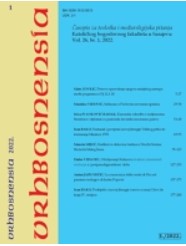SABLAZAN U PAVLOVIM IZVORNIM SPISIMA
SCANDAL IN PAUL’S ORIGINAL WRITINGS
Author(s): Marinko VidovićContributor(s): Josip Knežević (Translator), Kevin Sullivan (Translator)
Subject(s): Christian Theology and Religion, Biblical studies, Hermeneutics
Published by: Katolički bogoslovni fakultet
Keywords: God’s plan; care for others; Christ’s cross; human standards; fall; stumble; scandal; conscience; knowledge; faith; prophetic action;
Summary/Abstract: Starting from the experiential meaning of the term “scandal” and its Old Testament concept, the author explores Paul’s original texts in which the verb σκανδαλίζω and the noun σκάνδαλον and their synonyms λίϑος προσκόμματος and πέτρα σκανδάλου appear. The paper is divided into two parts based on the uses of verb or noun. The first part examines the texts of 1 Cor 8:13, 2 Cor 11:29 and Rom 14:21; and the second part examines the texts 1 Cor 1:23, Gal 5:11 and Rom 9:33; 11:9; 14:13; 16:17. Verbal use refers to scandal as a free (un)intentional human activity that results in doubts, entanglements, and deviations from the right path, and blocks the process of salvation. If it is a peripheral reality for salvation (rituals, food), it should be given up, and any scandalous action that occurs due to the correct immersion in God’s saving plans is not scandalous simply because it results in false and hypocritical scandal. For the scandal of God’s saving plans in their historical realization, culminating in the cross of Jesus Christ, Paul uses the noun. This scandal is inevitable because of wrong human standards applied to God and his saving activity. In the conclusion, the author summarizes the results of the research, emphasizing that Paul approaches the phenomenon of scandal in a very nuanced way and that he very skillfully integrates scandal in God’s historical but mysterious actions, in the scandal of God himself, who always remains for men semper maior.
Journal: Vrhbosnensia
- Issue Year: 2022
- Issue No: 1
- Page Range: 29-50
- Page Count: 22
- Language: Croatian

